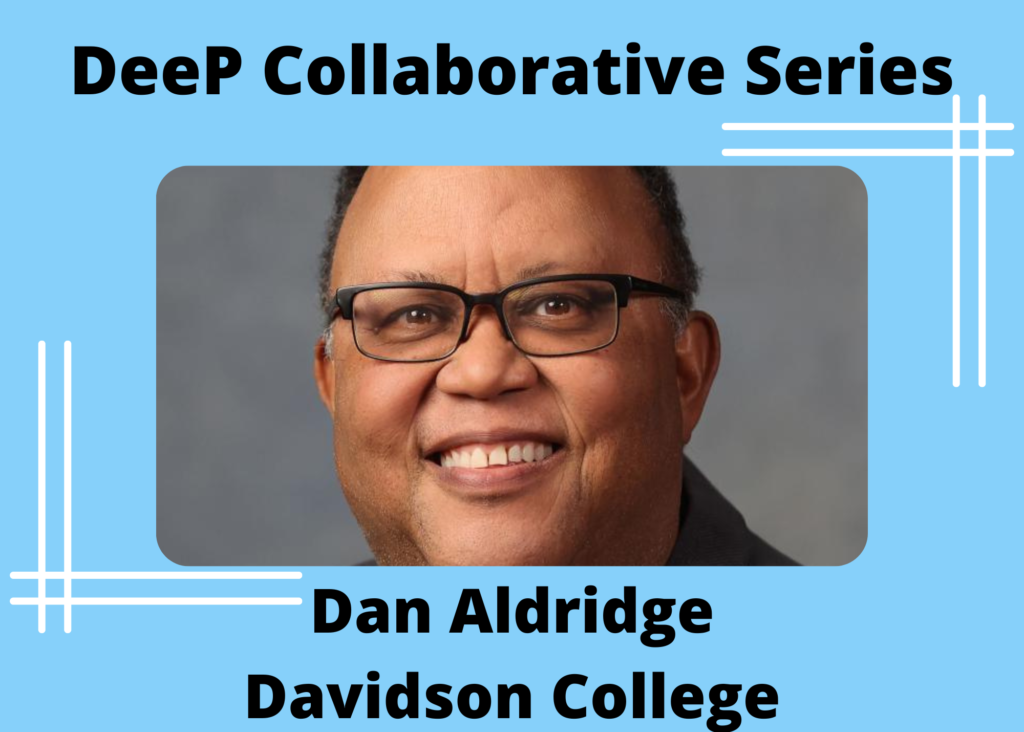
By Dan Aldridge (Chair & Professor of Africana Studies, Professor of History, DeeP Collaborative Member)
The Deliberative Pedagogy (DeeP) Faculty Collaborative consists of 20+ faculty from Davidson College and five other Associated Colleges of the South institutions who are committed to learning and implementing new ways to improve and deepen the quality of their class discussions. These faculty come from a wide array of disciplines and backgrounds. They come together to study and discuss different deliberative pedagogy methods, share their ideas and questions with one another, and work to embed deliberation in their classrooms. In this special blog series, members of the Collaborative describe and reflect on their experiences developing and teaching their deliberation-involved courses.
I agreed to participate in the Deliberative Pedagogy (DeeP) Collaborative because I wanted to improve the quality of student engagement with major issues in American history without fear of facing and expressing a wide range of points of view and to encourage their development as citizens who will be engaged in public issues in the decades to come. I teach a course that is an introduction to 20th century US History aimed primarily and 1st and 2nd year students. I focused the course on four broad “issues”: The United States’ emergence as an imperial power and future world power at the beginning of the 20th century; the life and career of Margaret Sanger as a way of exploring issues involving feminism, birth control, eugenics and related issues; varying interpretations of the meanings of the civil rights movement of the 1960s; and the different views of liberals and conservatives about the direction of American life since the 1960s.
After we finished readings, lectures, and discussions about each issue I would assign groups of students to hold a debate about the issues raised. For example, I asked one group of four students to support the United States’ becoming an imperial and global power in the early 20th century while another group of four argued the anti-imperialist position. After each side made its presentation the remaining students in the course would ask questions of the two debate teams. Finally, the class as a whole would discuss the issues raised. I have found from in-class observation, student comments, and student evaluations that they greatly enjoyed the debates and found them to be pedagogically valuable. The debate/discussion format seems to enable students to take historical issues that seemingly belong in the “past” come alive and become more relevant to them and their contemporary lives.
Students also reacted well to reading a wide variety of points of view about historical issues including perspectives from the Right, Left, and Center. Students read strongly pro-imperialist and somewhat racialist arguments for imperialism by authors such as Theodore Roosevelt; they read scathing critiques for US foreign policy from the Left by Noam Chomsky; they watched African American conservative intellectual Thomas Sowell critique much of the conventional wisdom about race and rights held by liberals and progressives; and they read Jeanne Theoharis argue that our understanding of civil right activism of the 1960s understates its radicalism. They also read Catholic writers who strongly critiqued birth control, abortion and feminism as well as feminist authors who strongly supported those things.
I found that students were not angered or intimidated by being exposed to a wide variety of viewpoints, including many that would not be currently deemed to be “correct” or “polite.” Indeed, a number commented on how they liked that the course was open to a wide variety of opinions and not committed to promoting a particular ideology or point of view. I plan to incorporate more elements in deliberative discussion in other courses I teach where needed and appropriate.
